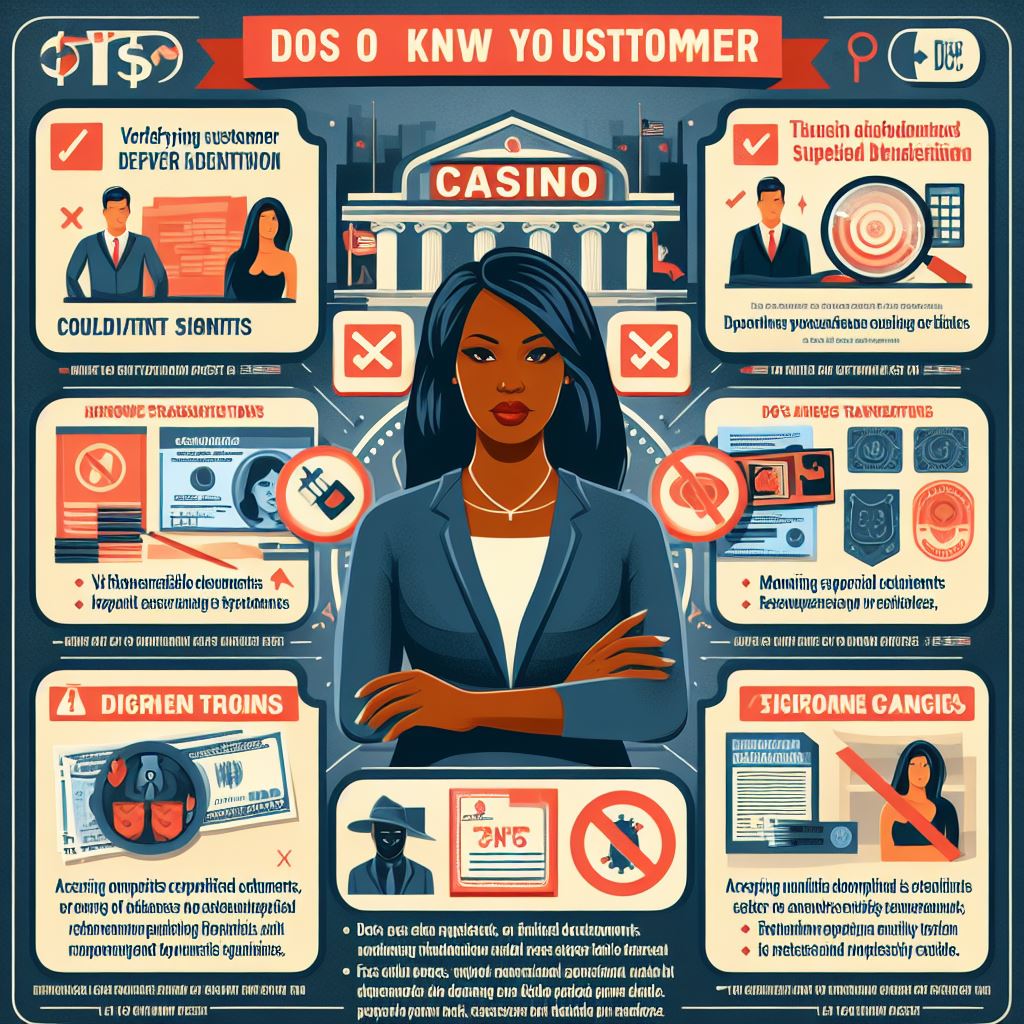damnednice.com, In the world of casino gaming, where excitement and entertainment abound, ensuring compliance with Know Your Customer (KYC) regulations is essential to maintaining integrity, security, and trust. KYC compliance helps casinos verify the identities of their customers, detect and prevent fraudulent activities, and adhere to legal and regulatory requirements. However, navigating the complexities of KYC compliance can be challenging, requiring a deep understanding of best practices, dos, and don’ts. In this article, we delve into the dos and don’ts of casino KYC compliance, providing insights, strategies, and tips for ensuring adherence to regulations while enhancing the customer experience.
In the dynamic world of casinos, Know Your Customer (KYC) compliance is a critical pillar that upholds integrity, fosters trust, and ensures responsible gaming practices. In this humanized exploration, we delve into the dos and don’ts of casino KYC compliance, emphasizing the importance of safeguarding players, preventing fraud, and creating a secure environment for all.
The Dos of Casino KYC Compliance:
Prioritize Player Safety: Make player safety and protection a top priority. Implement robust KYC procedures to verify the identities of players, ensuring that they are of legal age and meet regulatory requirements. Conduct thorough background checks to mitigate the risk of fraud, money laundering, and other illicit activities. By prioritizing player safety, you create an environment that promotes responsible gambling and safeguards the well-being of your customers.
Collect Relevant Information: Gather the necessary information from players as part of the KYC process. This may include personal details, identification documents, proof of address, and any additional documentation required by regulatory authorities. Ensure that the information collected is accurate, up-to-date, and securely stored. By collecting relevant information, you can establish a comprehensive player profile that aids in fraud detection and prevention.
Implement Robust Identity Verification: Utilize reliable and advanced identity verification methods to authenticate player identities. This may involve verifying identification documents, conducting facial recognition checks, or utilizing biometric technology. Implementing robust identity verification measures instills confidence in the authenticity of player accounts and helps prevent identity theft and fraudulent activities.
Regularly Update KYC Procedures: Stay abreast of evolving regulations and industry best practices, and adapt your KYC procedures accordingly. Regularly review and update your compliance policies to ensure they align with the latest legal requirements. This proactive approach demonstrates your commitment to maintaining compliance and staying ahead of emerging risks.
Train Staff and Promote Awareness: Provide comprehensive training to your staff on the importance of KYC compliance and responsible gaming practices. Equip them with the knowledge and tools necessary to identify suspicious behavior, handle sensitive information securely, and respond appropriately to compliance-related issues. Promote a culture of compliance throughout your organization, emphasizing the significance of KYC procedures in building trust and protecting players.
The Don’ts of Casino KYC Compliance:
Don’t Neglect Compliance Obligations: Never overlook or underestimate the importance of KYC compliance. Compliance is not just a legal requirement; it is a moral and ethical obligation to protect players and maintain the integrity of the casino industry. Neglecting or circumventing compliance obligations can lead to severe consequences, including legal penalties, reputational damage, and loss of customer trust.
Don’t Compromise Data Security: Never compromise on the security of player data. Implement robust data protection measures, including encryption, secure storage systems, and access controls, to safeguard sensitive information. Regularly assess and update your data security protocols to mitigate the risk of data breaches and unauthorized access.
Don’t Delay or Ignore Red Flags: Promptly and diligently address any red flags or suspicious activities identified during the KYC process. Investigate and document any concerns, report them to the appropriate authorities as required, and take necessary actions to mitigate risks. Ignoring or delaying the resolution of red flags can have serious consequences, both for your casino’s reputation and for the players involved.
Don’t Store Unnecessary Data: Avoid collecting or retaining unnecessary personal data of players. Adhere to data minimization principles, collecting only the information required for KYC compliance and legitimate business purposes. By minimizing data storage, you reduce the risk of data breaches and enhance overall data protection.
Don’t Compromise Responsible Gaming Principles: KYC compliance and responsible gaming go hand in hand. Don’t compromise responsible gaming principles in the pursuit of revenue. Implement measures to identify and assist players who may exhibit signs of problem gambling or require support. Encourage responsible gambling practices and provide resources for players to seek help if needed.
By following the dos and avoiding the don’ts of casino KYC compliance, you create a secure and trustworthy environment that protects players, prevents fraud, and upholds the highest standards of responsible gaming. Embrace the importance of KYC compliance as a cornerstone of your casino operations, ensuring a safe and enjoyable experience for all players.
Understanding KYC Compliance
Before delving into the dos and don’ts of casino KYC compliance, it’s essential to understand what KYC compliance entails and why it’s important. In this chapter, we provide an overview of KYC regulations in the context of the casino industry, discussing the objectives of KYC compliance, the legal and regulatory requirements, and the potential consequences of non-compliance. We also explore the role of KYC in preventing money laundering, terrorist financing, and other illicit activities, highlighting its importance in safeguarding the integrity of the gaming industry.

Dos of Casino KYC Compliance
Effective KYC compliance requires a proactive and comprehensive approach that prioritizes accuracy, diligence, and customer-centricity. In this chapter, we explore the dos of casino KYC compliance, providing actionable insights and best practices for ensuring compliance while enhancing the customer experience. From conducting thorough identity verification checks to implementing robust customer due diligence processes, we discuss strategies for effectively managing KYC requirements and mitigating compliance risks. We also highlight the importance of ongoing monitoring and review to identify and address potential compliance issues promptly.
Don’ts of Casino KYC Compliance
While there are many best practices for casino KYC compliance, there are also common pitfalls and mistakes to avoid. In this chapter, we explore the don’ts of casino KYC compliance, discussing common errors and misconceptions that can undermine compliance efforts and expose casinos to regulatory scrutiny and penalties. From failing to keep customer information up to date to relying solely on automated verification systems, we discuss the risks associated with cutting corners and taking shortcuts in KYC compliance. We also highlight the importance of avoiding discriminatory practices and respecting customer privacy and confidentiality.
Leveraging Technology for KYC Compliance
Technology plays a crucial role in streamlining and enhancing KYC compliance processes, enabling casinos to verify customer identities more efficiently and effectively. In this chapter, we explore the latest technologies and tools available for KYC compliance, from biometric authentication and facial recognition to machine learning and artificial intelligence. We discuss how these technologies can help casinos improve the accuracy and reliability of identity verification, reduce manual errors, and enhance the overall customer experience. We also highlight the importance of selecting the right technology solutions and integrating them seamlessly into existing systems and processes.
Educating Staff and Customers
Effective KYC compliance requires buy-in and cooperation from all stakeholders, including casino staff and customers. In this chapter, we discuss the importance of educating staff and customers about KYC requirements, procedures, and best practices. From providing comprehensive training programs for casino employees to offering clear and transparent communication to customers, we explore strategies for promoting awareness and understanding of KYC compliance. We also highlight the role of customer engagement and empowerment in fostering a culture of compliance and accountability within the casino environment.
Continuous Improvement and Adaptation
KYC compliance is an ongoing process that requires continuous monitoring, evaluation, and adaptation to evolving risks and regulatory requirements. In this chapter, we discuss the importance of continuous improvement in KYC compliance, including regular reviews of policies, procedures, and technologies. We explore strategies for staying abreast of changes in regulatory landscape and industry best practices, as well as for implementing feedback mechanisms and performance metrics to measure the effectiveness of KYC compliance efforts. We also highlight the importance of collaboration and information sharing within the gaming industry to address common challenges and promote best practices in KYC compliance.
Balancing Compliance with Customer Experience
While KYC compliance is essential for maintaining integrity and security in the casino industry, it must be balanced with the need to provide a positive and seamless customer experience. In this final chapter, we explore strategies for achieving this balance, from streamlining verification processes to leveraging data analytics and customer insights to personalize and enhance the customer journey. We discuss the importance of striking the right balance between compliance and convenience, ensuring that KYC requirements are met without unduly burdening customers or impeding their gaming experience. We also highlight the role of trust and transparency in building strong relationships with customers and fostering loyalty and advocacy.
Conclusion:
Navigating the maze of casino KYC compliance requires a nuanced understanding of best practices, dos, and don’ts. By prioritizing accuracy, diligence, and customer-centricity, casinos can ensure compliance with KYC regulations while enhancing the overall customer experience. By leveraging technology, educating staff and customers, and embracing a culture of continuous improvement, casinos can stay ahead of the curve and adapt to evolving regulatory requirements and industry trends. Ultimately, by striking the right balance between compliance and customer experience, casinos can build trust, foster loyalty, and position themselves for long-term success in the dynamic and competitive gaming industry.


